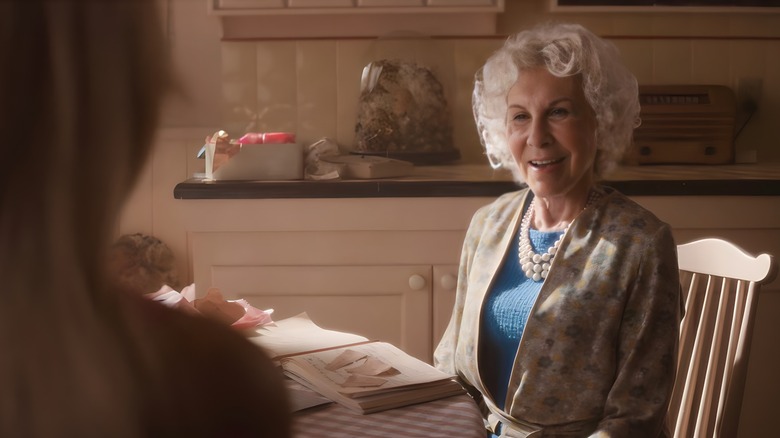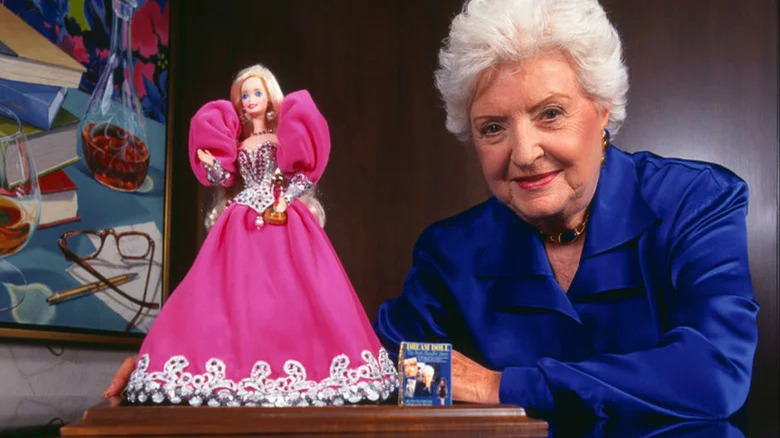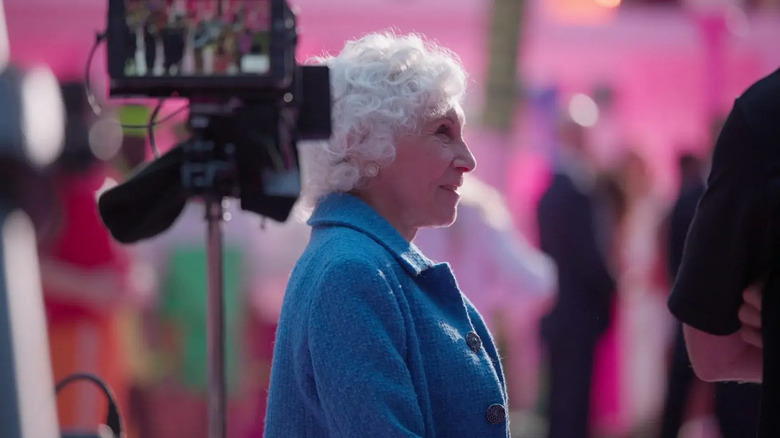Rhea Perlman's Mysterious Barbie Character Deserves A Closer Look
This article contains spoilers for "Barbie."
From the very first trailer, it was obvious that Greta Gerwig was the perfect person to bring "Barbie" to the big screen. Not only is she a gifted filmmaker who has delivered phenomenal works like "Lady Bird" and "Little Women," but she's also someone who wanted to honor the legacy of the Barbie doll as a cultural institution in addition to discussing themes of gender disparity and how the patriarchy hurts us all. Gerwig and co-writer Noah Baumbach clearly did their homework when coming up with the screenplay, incorporating multiple areas of Barbie's history, including the creator of the doll herself.
We've known for a while now that Rhea Perlman had been cast in "Barbie," but without an individual character poster, no one knew who she was going to play. Well, after a slapstick chase scene through the halls of Mattel, Barbie (Margot Robbie) finally comes face to face with Perlman, donning statement pearls and curly, white hair. Who is she? Why, she's the ghost of Ruth Handler, of course!
What feels like a glorified cameo later becomes one of the most powerful moments of the film. "We mothers stand still so our daughters can look back to see how far they have come," she tells Barbie, personifying both the role of Mother and Creator for the blonde doll. She's the one who holds Barbie's hand as she enters the realm of the living as "Barbara," a comforting presence to assure her that she's going to be okay.
Ruth Handler: Mother of Barbie
Ruth Handler, the real person, was the first president of Mattel, a company she co-founded with her husband Elliot (who would later invent Hot Wheels) and their business partner Harold Matson. What started out as a family business became a multi-billion-dollar empire, led by the popularity of Handler's most incredible creation — Barbie.
The origin story of Barbie is somewhere between fact and legend. It is true that she straight-up stole the design of the German gag-gift Bild Lilli doll and modified it to make Barbie, but the accepted genesis of Barbie is a story about Handler watching her daughter Barbara play with paper dolls of adult women, audibly daydreaming about what it was going to be like to be a grown-up. It was then that Handler realized the only physical, 3D dolls that existed on the market were baby dolls. How can a young girl imagine a life beyond motherhood if one of her first toys doubles as a training device?
"My whole philosophy of Barbie was that, through the doll, the little girl could be anything she wanted to be," Handler wrote in her 1994 autobiography, "Dream Doll: The Ruth Handler Story." She continued, "Barbie always represented the fact that a woman has choices." But folks weren't sold on the idea. "I really think that the squeamishness of those designers — every last one of them male — stemmed mostly from the fact that the doll would have breasts," she wrote. "Even Elliot, who has an uncanny knack for correctly predicting what others will buy, feared that no mother would buy her daughter a doll with a chest."
Underestimating the influence of young women is foolish
Just as the men at Mattel scoffed at the idea of Barbie being popular, so too has Hollywood scoffed at the idea of telling stories catering to women's interests. Catherine Hardwicke, the director of the first "Twilight" film, has spoken at length about the difficulties she faced getting the film made. No studio wanted "Twilight" because they thought there wasn't a market for it. She was told to expect maybe $29 million at the box office because that's what "The Sisterhood of the Traveling Pants" made. "We made $69 million opening weekend and $400 million overall," she said. "People were not expecting it." And this is just one of the many, many examples of women's interests not only being popular, but profitable.
The Beatles became the biggest band in the world not just because they were gifted musicians, but because young women were obsessed with them and their Beatlemania skyrocketed them to superstardom. As Vox rightfully pointed out in their study of teen girls as cultural tastemakers, "to be a teenage girl is to simultaneously be pop culture's ultimate punching bag, cash cow, and gatekeeper." In the lead-up to Barbenheimer weekend, film journalists ranging from the bigoted to the brilliant have all expressed their shock and awe at a movie about "Barbie" outperforming an epic from Christopher Nolan, when this shouldn't be a surprise at all.
The addition of Ruth Handler as a character in "Barbie" feels like a full circle moment for the doll, the brand, and the generations of those who love her. They underestimated Handler and she changed the world. They underestimated "Barbie," and yet the film is poised to be the biggest woman-led summer blockbuster of all time.
I guess women, like history, will just have to continue to repeat themselves.


